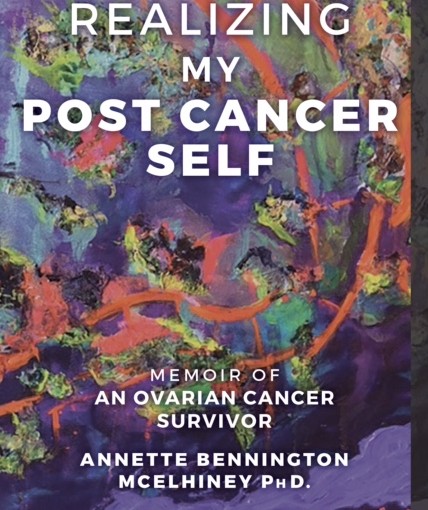By: Annette McElhiney
One
Facing cancer makes you think about things you’ve never have before. It makes you feel things you wish you’d never have to. It forces you to change. Suddenly you find yourself a member of an unfamiliar club, to which no one really wants to belong. Sure, I bragged to my gynecologist-oncologist early on that I rejected his prognosis, and that I had a 25%-33% chance of surviving for five years. I said, “I’ve never been in the bottom 25% or 33% of any class and I don’t intend to be there now.” But I was bluffing! Like most of cancer patients, I was sad and I was scared. I was sad that if I lost my battle with cancer, I would have to leave my family and friends, and I was scared of closing the door to my life.
I have ovarian cancer, but I seriously think that most people diagnosed with any cancer or terminal illness can identify with having some of the same dark thoughts and feelings. Being told that the chances of living five years are almost nonexistent can jolts your sense of security. The cold precision of my diagnosis (Stage IIIC metastatic poorly differentiated serous ovarian cancer and a 25%–35% chance of living five years) split my life into two stages: before and after cancer. I think that many cancer survivors feel the same shift.
Two
When I was doing chemotherapy at my oncologist’s office, I was surprised to learn that some of the women kept silent and didn’t tell their children or friends that they had ovarian cancer. Now I know why. If people don’t know you have cancer, then they don’t expect you to be “skin and bones” with shallow skin and sores in your mouth. In some ways, having cancer is like being in a wreck on a crowded highway! Travelers always pause and look toward the scene of an accident just like people peek at cancer patients to see if they are looking frail or defeated. As a person with cancer, you always know that when you go places or talk with others you make them feel better because they don’t have cancer. You also feel that when you leave, people will ask, “How is she really? How is she handling it? Do you think she will beat it? How long do you think she has?” In other words, as someone with cancer, you feel very visible, but also very alone.
I’m not saying that people’s thoughts and actions are malicious — most people have been kind and wonderfully supportive of me throughout my treatment. One clerk at an outlet store, when she noticed my exhaustion from shopping for a short time, insisted on carrying my bags out to the car for me. My UPS delivery man brought a package to my front door, told me he’d heard I’d not been well, and said he was praying for me. I lost it both times, and cried as I thanked them for their kindness. Yet despite the graciousness others have shown me, I still feel alone and retreat inside myself and become silent.
From the time of my diagnosis, however, I have not tried to hide my cancer diagnosis. No one is cancer-proof, and who knows when another friend, family member, or acquaintance may be diagnosed? Immediately after surgery, I began sending out e-mail updates on my condition. These e-mails often elicited encouraging responses, which helped me heal. Sometimes they included requests for me to contact other women who had ovarian cancer. Such requests gave me a sense that I’m giving something back to others. Most cancer patients just want support, not pity. I have been showered with nourishing food, prayers, gifts, warm wishes, and kindnesses from my good friends and neighbors.
Perhaps more effort needs to be made to let people know that cancer is just the result of the body going metabolically out of control at the cellular level. While we know that certain factors (such as cigarette smoke may precondition lung cancer cells to be more susceptible to out-of-control growth), we don’t know the specific triggers for the physiological changes in ovarian cancer. Until more research is completed on these triggers and on the mechanisms, drugs, and substances that inactivate or reverse them, the cure rate for ovarian cancer will not go up.
To read more of Annette’s posts in The Clearity Portal, please click here to login.


